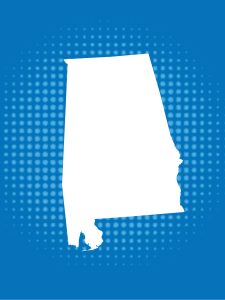Alabama offers families multiple pathways to homeschooling. However, each option has different requirements.
History
Alabama is in the southern region of the United States. While homeschooling is not legalized by name, permission for parents to school at home began in 1982 under the state’s “church school” statute. This allowed parents and religious schools to bypass the state’s “private tutor” law and required instruction by certified teachers.
Regulation
In Alabama, parents have three options for homeschooling for students ages 6 to 17. They can elect to establish a homeschool program within a church or private school or provide homeschooling through a private tutor. All homeschool options require reporting of student enrollment and attendance to the superintendent. Churches and private schools have the autonomy to establish their instruction and teacher qualifications policies, while other regulation is limited (sec 16-28-7). However, homeschooled students in a private school must be immunized (sec 16-30-4), take a physical education course (sec 16-40-1), and instruction must occur in English. The state requires private homeschool tutors to provide at least three hours of instruction daily for 140 days and be certified teachers (sec 16-28-5). They must also cover several branches of required study.
All homeschool options require attendance registries (sec 16-28-7). The state does not require students take standardized assessments. Graduation exams are optional and available to nonpublic school students (sec 16-3-40).
Virtual schooling, another “home” schooling alternative, is for Grades 9-12. These students participate as full-time students in their local public schools.
Currently, there is no state policy for access to public school classes or activities for homeschooled students. Nonpublic school students may have part-time access to extracurricular activities provided at public schools. However, no explicit statute governs access to public school offerings for those outside the public school system. The state did not provide information on access to special education services.
State Data
Alabama does not report homeschool participation. While the lack of official data is problematic when students are required to file attendance, U.S. Census estimates indicate that 5.0% of Alabama families homeschooled in the spring of 2020, and 12.1% by fall of 2020. This is slightly above the national average of 11.1% at the time. Based on U.S. Census data, our calculations indicate that about 6.81% of K-12 students in Alabama were homeschooled during the 2022-23 school year, and 7.99% during the 2023-24 school year. Due to survey changes, the data from 2020 reflects the percentage of households, while the data from following years reflects the percentage of students.
Cross-Sector Comparison
We cannot calculate a cross-sector comparison because we lack information on homeschool participation.
School Choice Context
In addition to homeschooling, parents in Alabama have multiple school choice options. These include enrollment in traditional public, private, magnet, charter, and virtual online schools. Inter- and intra-district choice is not allowed. Alabama does not provide public funds directly for homeschools. However, in 2023, the state passed the Alabama Accountability Act, expanding tax credit scholarships for students with disabilities and providing $10,000 for private tuition for qualifying students. Also, in 2023, Alabama passed the School Choice Act, opening the door to education savings accounts of $6,900 for the 2024-2025 school year.
Commentary
While Alabama requires homeschool parents to file with the state, it does not publicly report these data as it does with similar data from other education sectors. Compiling and reporting these data would justify the regulatory burden of annual filing placed on homeschoolers in the state. Further, publicly reporting homeschool participation would increase transparency and better inform our understanding of homeschooling in the state and the nation.

-
12.1% Families
Around 12.1% of families in Alabama homeschooled during the height of the pandemic (Fall 2020).
-
1982 Permission to Homeschool
Permission for parents to school at home began in 1982 in Alabama.
-

-
More Information
12.1% Families
Around 12.1% of families in Alabama homeschooled during the height of the pandemic (Fall 2020).
1982 Permission to Homeschool
Permission for parents to school at home began in 1982 in Alabama.

More Information
Last updated March 2025.